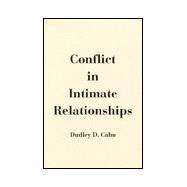Why is the potential for conflict so great for intimate partners? This volume integrates research from psychology, sociology, communications, and family studies to provide a comprehensive, practical synthesis of findings concerning conflict in close personal relationships. Combining discussion of both theory and practice, the volume illuminates why conflict occurs frequently between friends, romantic partners, distressed couples, and divorcing spouses, and also offers professionals a framework for understanding conflict as they try to help defuse strife.
The book establishes conflict as a process that lies dormant in any mutually dependent relationship. Depending on the partners' strategies in conflict, the potential for disagreement can quickly become a real obstacle between them and can even threaten to end the relationship. To better determine the source of stress, three different research paradigms are presented to explain the conflict process and why it occurs, as well as to suggest what can be done to help partners manage conflict and preserve intimacy.
The systems-interactionists' approach is presented first. This section discusses methods used to characterize destructive and constructive communication behavior patterns and strategies for dispute resolution. Next, the rules-interventionist approach examines ways in which a mediator can help divorcing couples end one relationship and begin another. Finally, the cognitive-exchange approach is considered. Methods used to determine the antecedent conditions which influence partners' reactions during conflict are presented and approaches for helping them modify destructive communication strategies are discussed. Throughout, terminology and measurements are made to correspond across disciplines so that the work is accessible to all.
In addition to relating particular studies and research programs to their appropriate research approaches, the book shows how conflict is uniquely handled when distressed partners engage in problem solving, when disputing partners engage in mediation, and when same and opposite sex partners participate in developing relationships. Comparison and contrast emphasize the role played by conflict communication behavior, rules, and strategies found in developing intimate relationships, the destructive conflict characteristic of emotionally distressed couples, and the bargaining/negotiation characteristic of formal mediation.
Drawing together the wide array of research on the topic in a user-friendly format, this book is an ideal resource for any investigator interested in distressed relationships. Offering practical methodology firmly founded in theory, it is invaluable reading for clinicians working with people in conflict. The book also serves as a text for advanced undergraduate and graduate students of conflict in interpersonal relationships, and as supplementary reading for a variety of courses where conflict is a focus of study.
The book establishes conflict as a process that lies dormant in any mutually dependent relationship. Depending on the partners' strategies in conflict, the potential for disagreement can quickly become a real obstacle between them and can even threaten to end the relationship. To better determine the source of stress, three different research paradigms are presented to explain the conflict process and why it occurs, as well as to suggest what can be done to help partners manage conflict and preserve intimacy.
The systems-interactionists' approach is presented first. This section discusses methods used to characterize destructive and constructive communication behavior patterns and strategies for dispute resolution. Next, the rules-interventionist approach examines ways in which a mediator can help divorcing couples end one relationship and begin another. Finally, the cognitive-exchange approach is considered. Methods used to determine the antecedent conditions which influence partners' reactions during conflict are presented and approaches for helping them modify destructive communication strategies are discussed. Throughout, terminology and measurements are made to correspond across disciplines so that the work is accessible to all.
In addition to relating particular studies and research programs to their appropriate research approaches, the book shows how conflict is uniquely handled when distressed partners engage in problem solving, when disputing partners engage in mediation, and when same and opposite sex partners participate in developing relationships. Comparison and contrast emphasize the role played by conflict communication behavior, rules, and strategies found in developing intimate relationships, the destructive conflict characteristic of emotionally distressed couples, and the bargaining/negotiation characteristic of formal mediation.
Drawing together the wide array of research on the topic in a user-friendly format, this book is an ideal resource for any investigator interested in distressed relationships. Offering practical methodology firmly founded in theory, it is invaluable reading for clinicians working with people in conflict. The book also serves as a text for advanced undergraduate and graduate students of conflict in interpersonal relationships, and as supplementary reading for a variety of courses where conflict is a focus of study.








